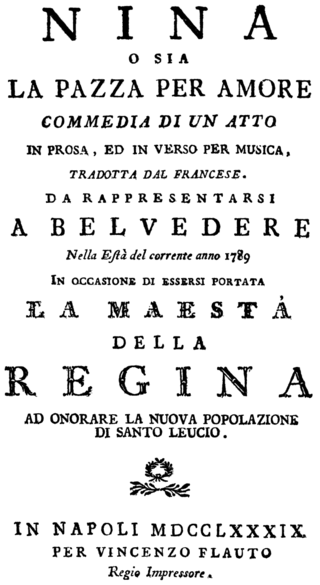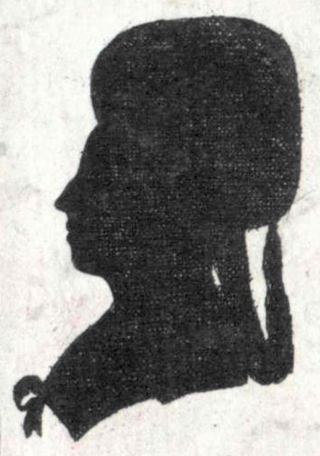
Austrian Nazism or Austrian National Socialism was a pan-German movement that was formed at the beginning of the 20th century. The movement took a concrete form on 15 November 1903 when the German Worker's Party (DAP) was established in Austria with its secretariat stationed in the town of Aussig. It was suppressed under the rule of Engelbert Dollfuss (1932–34), with its political organization, the DNSAP banned in early 1933, but was revived and made part of the German Nazi Party after the German annexation of Austria in 1938.

Nina, o sia La pazza per amore is an opera, described in 1790 as a commedia in prosa ed in verso per musica, in two acts by Giovanni Paisiello to an Italian libretto by Giovanni Battista Lorenzi after Giuseppe Carpani's translation of Benoît-Joseph Marsollier's Nina, ou La folle par amour, set by Nicolas Dalayrac in 1786. The work is a sentimental comedy with set numbers, recitative and spoken dialog. It is set in Italy in the 18th century. Nina was first performed in a one-act version at the Teatro del Reale Sito di Belvedere in Caserta, San Leucio on 25 June 1789. The revised and familiar two-act work was presented at the Teatro dei Fiorentini in Naples in the autumn of 1790.
Anja Harteros is a German soprano. Since winning the 1999 Cardiff Singer of the World competition she has been particularly associated with the Bavarian State Opera and enjoyed an international career.

Hildegard Zadek was a German operatic soprano. She was Kammersängerin at the Vienna State Opera and performed internationally.

Rudolf Simek is an Austrian philologist and religious studies scholar who is Professor and Chair of Ancient German and Nordic Studies at the University of Bonn. Simek specializes in Germanic studies, and is the author of several notable works on Germanic religion and mythology, Germanic peoples, Vikings, Old Norse literature, and the culture of Medieval Europe.

Caterina Gabrielli, born Caterina Fatta, was an Italian coloratura singer. She was the most important soprano of her age. A woman of great personal charm and dynamism, Charles Burney referred to her as "the most intelligent and best-bred virtuosa" that he had ever encountered. The excellence of her vocal artistry is reflected in the fact that she was able to secure long-term engagements in three of the most prestigious operatic centers in her day outside of Italy.

Montag aus Licht is an opera by Karlheinz Stockhausen in a greeting, three acts, and a farewell, and was the third of seven to be composed for the opera cycle Licht: die sieben Tage der Woche. The libretto was written by the composer.

La villanella rapita is an opera giocosa in two acts by Francesco Bianchi. The libretto was by Giovanni Bertati.

Fanny Eckerlin (1802–1842) was an Italian mezzo-soprano who also sang contralto roles. During her career she was highly regarded, drawing favorable comparisons to Benedetta Rosmunda Pisaroni, but today she is remembered, if at all, for her association with the early career of Gaetano Donizetti, including creating the title role in his first publicly-performed opera, Enrico di Borgogna.
Beatrix Borchard is a German musicologist and author. The focus of her publications is the life and work of female and male musicians, such as Clara and Robert Schumann, Amalie and Joseph Joachim, Pauline Viardot-Garcia, and Adriana Hölszky. Also among her topics are the role of music in the process of Jewish assimilation, the history of musical interpretation, and strategies of Kulturvermittlung.
Renate Holm was a German-Austrian film actress and operatic soprano. She worked as a dentists' assistant and took private singing lessons, resulting in performances in musical films and schlager. She made her debut at the Vienna Volksoper in 1957, and moved on to the Vienna State Opera where she worked for decades. She appeared internationally and made many recordings, especially for the WDR in a series of operettas with conductor Franz Marszalek. She later worked as a voice teacher, juror at competitions, and festival manager. Her memoir was published in 2017.

Katharina Buchwieser was a German operatic soprano and actress. She was known as Cathinka, and her married surname was Lacsny von Folkusfálva. She appeared at theatres of Vienna, the Theater an der Wien and the Theater am Kärntnertor, then the court theatre. Franz Schubert dedicated compositions to her.
Janina Klassen is a German musicologist and professor at the Hochschule für Musik Freiburg.
Edith Saurer was an Austrian historian, university professor at the University of Vienna, scientific author, and publisher. She is regarded as a central cofounder and advocate of feminist historiography in Austria. She received the Käthe Leichter Prize, Gabriele Possanner State Prize, and the Golden Medal for her services to the State of Vienna.
Uwe Harten is a German musicologist, who works in Austria.
Ilse Erika Korotin is an Austrian philosopher and sociologist. She researched and published on the history of ideas of Nazism. At the Institute for Science and Art in Vienna, she heads the Documentation Centre for Women's Studies. Her work focuses on feminist biographical research and history of science.
Albrecht von Massow is a German musicologist. Since 2000 he has held a professorship for 20th century music and systematic musicology at the joint Institute for Musicology Weimar-Jena.

Mathilde Wildauer was an Austrian actress, later an operatic soprano, taking leading roles at the Theater am Kärntnertor in Vienna.
Marianne Sessi Natorp was an Italian soprano and composer. Her birth date is listed as 1770, 1771, 1773, or 1776 in various sources. She was best known as a member of the musical Sessi dynasty and a renowned operatic soprano who performed and composed as Marianne Sessi.

Therese Barbara Alberta Teyber was an Austrian operatic soprano.











